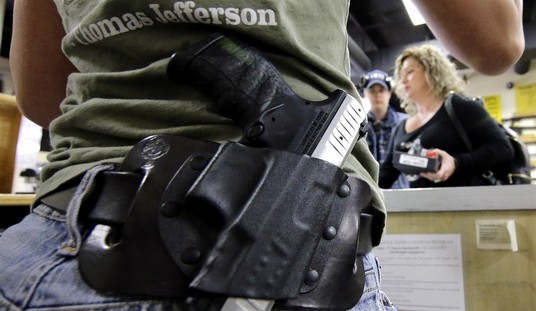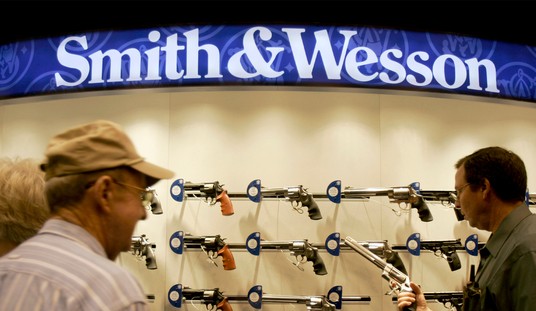
A familiar front in the gun ban wars is the straw purchase. A straw purchase occurs when one buys a gun for someone they know to be legally prohibited from gun ownership and subsequently transfers that gun to them. The actual crime is lying on the federal forms required for every new, point of sale firearm purchase.
Gun banners aren’t sure what they think of this law, or even if it exists. On one hand, they’re certain straw purchases are going on all the time, yet they’re constantly proposing and writing laws criminalizing what they seem to think is already criminalized. A recent Colorado law that seems to make any transfer—even between family members—criminal without the intermediate handling of a FFL dealer being a case in point. On the other hand, they weren’t the slightest concerned when the federal government committed thousands of straw purchases in the process of funneling weapons to Mexican drug cartels in Operation Fast and Furious, but of course since it was a Democrat administration doing that, it must be a phony scandal, so it’s understandable.
Now comes a new front in the war. What to do when a lunatic kills innocents? Sue the store in another state that sold the gun to someone else years earlier! PowerLine’s John Hinderaker has the story:
“In 2012, a man named William Spengler set his upstate New York house on fire, and lay in wait for firemen to respond to the blaze. When they did, he shot four of them with a rifle, killing two. Now some of the firefighters, or their heirs, are suing Gander Mountain, one of the country’s largest outdoor retailers:
‘The families of four New York state firefighters are suing St. Paul-based Gander Mountain, alleging that the retailer’s Rochester, N.Y.-area outlet could have prevented a ‘straw buyer’ from purchasing the rifle that was turned over to a convicted killer and used on Christmas Eve 2012 to kill two firefighters and wound two others.
The lawsuit, which has the legal heft of prominent gun control advocates behind it, said the rifle used in the bloody ambush should never have been sold to 22-year-old Dawn Nguyen in 2010 with the eventual shooter at her side.’
The suit alleges that Gander shouldn’t have sold Nguyen the rifle, even though she was a perfectly legal purchaser, because 1) Spengler was with her at the time; 2) she bought two firearms at once, a rifle and a shotgun; and 3) she allegedly paid cash.”
Let’s review: Gander Mountain (GM) sold the weapon used in the crime to a legal purchaser who paid cash, as people often do. She bought two guns at once—which is completely legal—only one of which was used in the crime. Two years later, one of the guns was used in a murder in another state by the man that accompanied the woman who bought the guns two years earlier, thus there is a two-year gap between the supposed “straw purchase” and the constructive possession of the weapon used by the killer. However:
“Nguyen, now 24, was convicted in April of falsifying a firearms form when she bought the guns. She was sentenced Monday to at least 16 months in prison.”
This would appear to strengthen the case against GM, but the substantial gap in time between the purchase and the crime is a significant factor that may negate it. The Minneapolis Star-Tribune, very much a leftist paper, also notes:
“Gander Mountain’s staff should have known that the purchase was being made for someone who was barred from possessing firearms, the suit continued, pointing out that the U.S. Bureau of Alcohol, Tobacco, Firearms and Explosives has warned that indicators of a straw purchase include multiple firearms being bought in one transaction, more than one person entering the store together and purchases made with cash.”
Interestingly, straw purchases are seldom prosecuted, and the Holder Department of Justice is no exception. Gun crime prosecutions of all kinds have declined under Holder.
My own experience in law enforcement is illustrative. In one particular case, I caught a ring of vehicle burglars. Using stolen money, one bought a handgun for another who, while an adult, was less than 21, thus too young to buy one himself. The transfer occurred as soon as the gun left the store. I recovered the gun not long thereafter, obtained confessions all around, obtained the original federal form signed by the straw purchaser, wrapped the case up nicely and neatly and delivered it to the ATF. They never prosecuted it. Too busy assisting gun running to Mexico I guess.
Hinderaker points out some interesting facts that will also have a bearing on this case:
“The suit spells out that Nguyen entered Gander Mountain with Spengler, who was prohibited from owning firearms after his conviction for killing his 92-year-old grandmother with a hammer.’
Prohibited from owning guns? More to the point, he should be prohibited from owning hammers. But the more relevant question is, what the heck is he doing out on the streets? A few moments’ research discloses that Spengler beat his grandmother to death with a hammer in 1980. He was convicted of murder, and soon became eligible for parole. His first parole hearing, in 1989, didn’t go well. He argued with the board over how many times he had struck his grandmother with the hammer, and mused aloud about the possibility that if he were freed, he may kill again: ‘If you were capable of it once, are you capable of it again?’ Nevertheless, the parole board freed him in 1998, following another parole hearing in 1997.”
Of course, various anti-gun organizations, politicians and hangers-on are clinging to this particularly creaky bandwagon. To their way of thinking, apparently Gander Mountain should have been able to infer, because Nguyen actually had someone with her when she bought a gun (that never happens), because she bought two guns at once (that never happens), and because she paid for them with cash (that never happens either), the GM employees should have known Nguyen was making a straw purchase for the person with her (I wonder if he stood within inches of her side the entire time, snarling and looking wild-eyed?) and perhaps even that he was a murderer who would commit multiple murders two years into the future. Failing to exercise the due caution anyone in their position apparently should be able to do, they are liable for massive damages.
I guess I’m in trouble. I seldom go anywhere without my wife, and I’ve actually purchased several firearms and various accessories at once while paying cash with her by my side. Obviously, the people who sold those items to me should have known I was making a straw purchase and refused to make the sale. Particularly when my wife was going through menopause, though the usually looked tranquil, she was dangerous indeed!
Where did Gander Mountain go wrong? They made a legal sale to a person legally able to buy guns. They completed all legally required paperwork and the “universal background check” also required. There is apparently no evidence they should have known that Spengler was going to receive, contemporaneously or at any time in the future, either of the weapons purchased, or that they had any reason to suspect that he was not lawfully able to purchase firearms. Apparently he did not say or do any anything that would make anyone suspicious. In fact, one might argue that the purchase of handguns might make a salesclerk more suspicious, if there was any suspicion to be had, since long guns of any description are so seldom used in any kind of crime.
It’s impossible not to sympathize with the firefighters that were injured by Spengler, and with the survivors of those killed, but if they prevail in this suit, the precedent established would be unconscionable. It would essentially require anyone selling firearms to be clairvoyant. In effect, it would shut down at least some commerce in firearms as some companies refused to be targets for lawsuits thrust upon them for doing nothing more than following the law while engaging in legal commerce. This is, of course, one of the goals of the gun banners supporting and riding the coattails of the suit; hamper or shut down lawful commerce in firearms by any means.
None of the measures gun banners champion would have the slightest effect on this situation. Even if gun retailers demanded that their employees deny sales to anyone buying more than one gun at a time with cash while in the company of anyone else, actual criminals would adapt by simply buying guns alone, one at a time, and with a debit or credit card, probably stolen. Or they would do as they usually do: steal guns or buy them on the black market.
One might reasonably ask what a lunatic that murdered his mother with a hammer was doing outside prison walls? Could that be the real, primary contributing cause of the deaths of the firemen and the killer’s sister? Absent the Gander Mountain purchase two years in the past, would the killer really have been unable to obtain a firearm? When no one is ultimately to blame but the killer, Gander Mountain makes a convenient and necessary straw man with deep pockets.
There are, however, no political points to be made in suing a parole board, which can’t be sued in the first place. There is no money to be made. And while one may heartily agree that the firefighters and their survivors deserves some kind of compensation, suing the innocent to obtain it is as wrong as the deaths of innocents, particularly when it might also harm others by denying them the firearms they need to protect their lives and the lives of others.








Join the conversation as a VIP Member